To save more money each month, start by tracking your expenses to spot spending patterns. Create and stick to a budget, cutting back on dining out in favor of home-cooked meals. Use coupons and shop sales for discounts, and reduce utility bills through energy-saving habits. Limit impulse buys by practicing delayed gratification, and opt for free or low-cost entertainment. Automate your savings to stay consistent—continue exploring these tips for even more ways to boost your savings.
Key Takeaways
- Track all expenses regularly to identify overspending and adjust your budget accordingly.
- Plan meals, buy in bulk, and use coupons to reduce grocery costs.
- Switch to energy-efficient appliances and set thermostats wisely to lower utility bills.
- Automate savings transfers immediately after payday to ensure consistent contributions.
- Limit impulse purchases by practicing delayed gratification and avoiding shopping alone.
Track Your Expenses to Identify Spending Patterns

Tracking your expenses is essential for understanding where your money goes each month. When you track expenses, you gain insight into your spending habits and can identify areas where you’re overspending. Use a notebook, spreadsheet, or budgeting app to record every purchase, from big bills to small coffee runs. This process is called expense analysis, and it helps you see patterns you might not notice otherwise. By regularly tracking expenses, you’ll discover what costs are unnecessary and where you can cut back. This awareness is the first step toward making smarter financial choices. When you understand your spending patterns, you’re better equipped to control your money and prioritize savings. Consistent expense tracking turns vague awareness into actionable insights, setting the foundation for a more frugal lifestyle. Additionally, understanding the concept of financial literacy can enhance your ability to make informed decisions about money management.
Create and Stick to a Budget
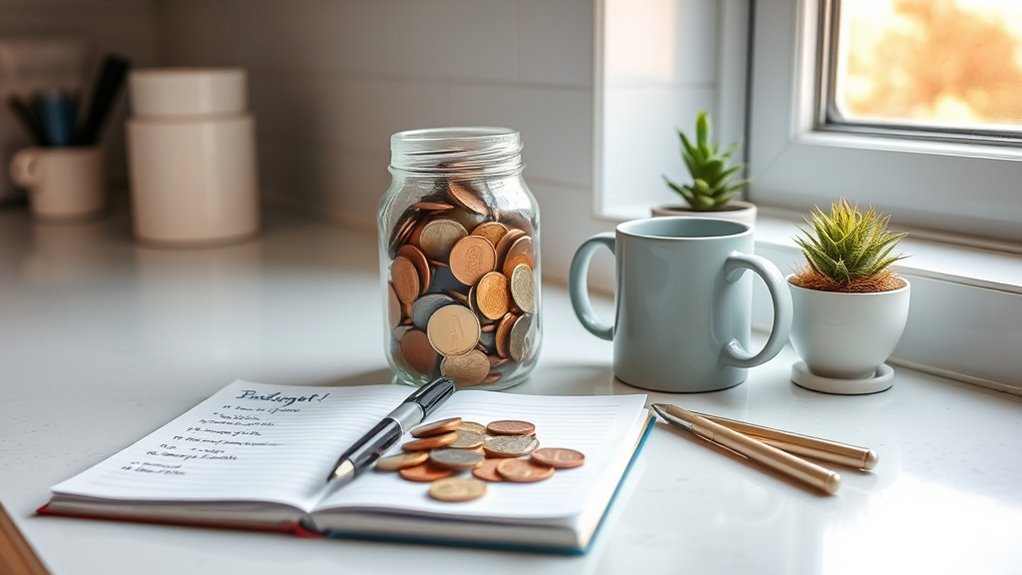
Creating a budget is the essential next step after understanding your spending habits, as it helps you allocate your money intentionally. Start by dividing your expenses into clear budget categories, like housing, groceries, transportation, and entertainment. This organization makes it easier to see where your money goes and identify areas to cut back. Use expense tracking to stay accountable, noting every purchase and reviewing your spending regularly. Set realistic limits for each category based on your income and priorities. Stick to your budget by avoiding impulse buys and adjusting as needed. Remember, transparency in affiliate relationships is important when reviewing your spending tools or resources. Incorporating insights from AI in Business, such as automation tools, can further streamline your budgeting process and help you maintain discipline. Consistency is key—review your budget weekly to ensure you’re on track. Incorporating knowledge about contrast ratio can also help you make better decisions about entertainment and leisure spending related to home cinema setups. Being aware of essential oils for relaxation can also support your overall well-being, making it easier to stick to your financial goals. Additionally, understanding the importance of emotional disconnection can motivate you to maintain healthy habits that support your financial discipline. Over time, this disciplined approach will help you save more money each month and build better financial habits.
Cut Back on Dining Out and Cook at Home

By planning your meals ahead of time, you can save money and reduce last-minute trips to restaurants. Batch cooking allows you to prepare large portions and enjoy leftovers throughout the week. These strategies make eating at home easier and more budget-friendly. Additionally, utilizing AI tools can help generate meal ideas and shopping lists to further streamline your meal planning process. Incorporating meal prepping techniques can also help you stay organized and avoid impulse purchases at the grocery store. Monitoring food spoilage signs can ensure your ingredients stay fresh longer, preventing unnecessary waste and saving money.
Meal Planning Strategies
Cutting back on dining out and cooking at home can considerably save money and improve your overall budget. Effective meal planning is key. Start by creating a detailed grocery list to avoid impulse buys and ensure you have all ingredients for the week. Incorporate meal prep sessions to prepare ingredients or entire meals in advance, saving time and reducing waste. This approach helps you stick to your budget and limits unnecessary spending. Additionally, choosing a cohesive color scheme can make your kitchen and dining areas more inviting, encouraging home-cooked meals and further savings.
Batch Cooking Benefits
Batch cooking allows you to prepare multiple meals at once, making it easier to stick to your budget and avoid last-minute dining out. With meal prep, you can cook large batches of your favorite dishes and store them for the week. This saves time and money, as you won’t need to buy takeout or eat out when you’re in a rush. Plus, batch cooking helps with portion control, so you can serve yourself just the right amount and reduce food waste. It also encourages healthier choices since you control the ingredients. Additionally, understanding the regulatory considerations involved in meal planning can help you avoid pitfalls and stay compliant with food safety standards. Being aware of appliance features like programmable settings and energy efficiency can enhance your cooking experience and save money over time. By planning and cooking in advance, you’ll find it easier to resist impulse dining out, keep your meals affordable, and stay on track with your savings goals.
Use Coupons and Look for Discounts
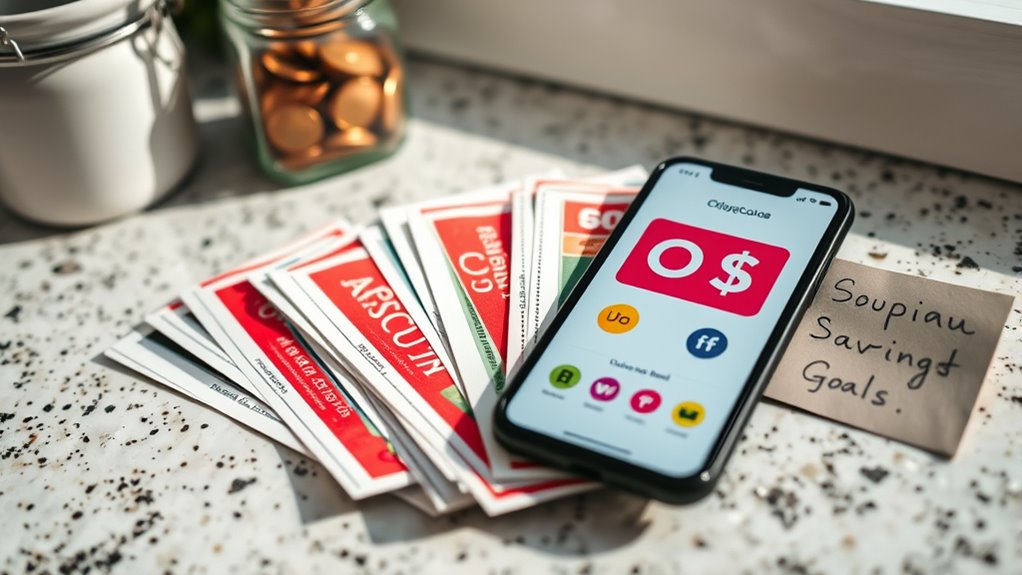
Using coupons and hunting for discounts can substantially lower your everyday expenses. By clipping coupons and finding discounts, you maximize savings on groceries, clothing, and entertainment. To get the most out of your efforts, consider these tips:
- Always check store flyers and online apps before shopping
- Sign up for email lists to receive exclusive coupons
- Use cashback apps to earn money back on purchases
- Compare prices online to find the best deals
- Be aware of cost factors associated with home security systems to better evaluate potential savings and choose options that fit your budget. Additionally, understanding artistic significance can help you appreciate the cultural value of traditional art forms when exploring creative hobbies or investments. Furthermore, understanding fraud prevention tools can help protect your financial information when shopping online and prevent potential losses. Being aware of relationship dynamics can also improve your interactions and negotiations during price comparisons or deal hunting.
Being proactive in finding discounts helps you stay within your budget and stretch your dollar further. Keep an eye out for limited-time offers and special promotions, and don’t forget to organize your coupons for quick access. Small savings here and there add up over time, making your money go further.
Reduce Utility Bills With Energy-Saving Habits
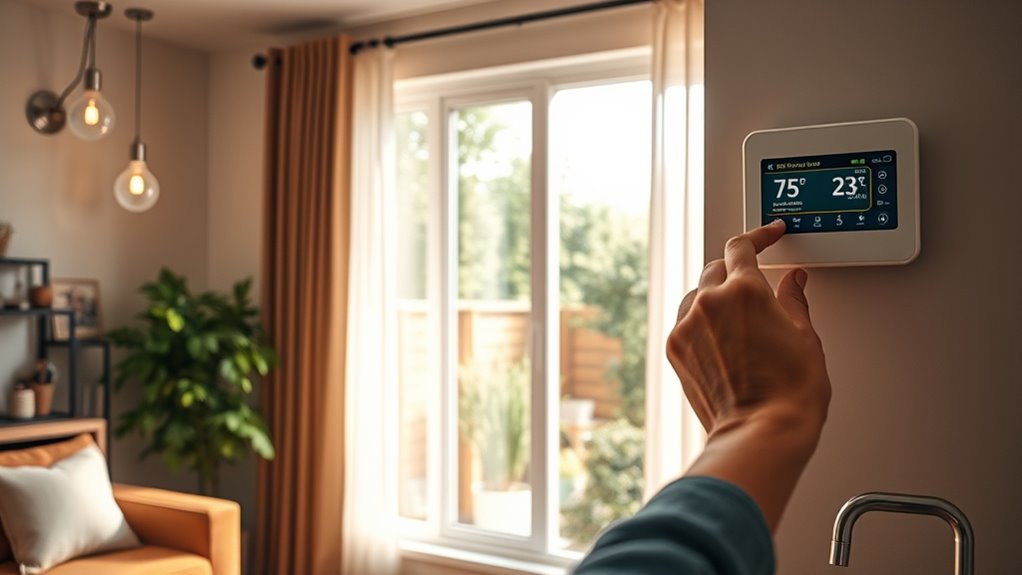
You can cut your utility bills by making simple changes around your home. Switch to LED bulbs, unplug devices when you’re not using them, and set your thermostat wisely. These small habits can add up to significant savings over time. Using energy-efficient appliances like heated mattress pads with low power consumption can also help reduce electricity costs. Additionally, choosing high-performance heat pumps for heating and cooling can further optimize your energy usage and savings. Regularly reviewing your energy consumption patterns can help identify additional areas for improvement and savings, and incorporating energy-saving technologies can enhance your overall efficiency.
Switch to LED Bulbs
Have you considered how switching to LED bulbs can substantially lower your energy bills? LED lighting upgrades are a simple way to boost energy efficiency in your home. They consume up to 75% less energy than traditional incandescent bulbs, saving you money over time. Plus, LEDs last much longer, reducing replacement costs. Here are some benefits:
- Lower monthly utility bills
- Reduced energy consumption
- Longer bulb lifespan
- Less heat production, keeping your home cooler
Unplug Idle Devices
Switching to energy-efficient LED bulbs is a great step toward lowering your utility bills, but there’s another simple habit that can make an even bigger difference: unplugging devices when they’re not in use. Many electronics and chargers draw power even when idle, wasting energy and increasing your bills. Practicing good device management is key to effective energy conservation. Make it a habit to unplug phones, tablets, laptops, and appliances when you don’t need them. Use power strips to turn off multiple devices at once, preventing standby power drain. Not only does this save money, but it also reduces your carbon footprint. Small actions like these add up over time, helping you keep more money in your pocket while supporting a greener lifestyle. Additionally, understanding energy consumption habits can lead to significant savings and environmental benefits over the long term. Being mindful of your energy use can make a noticeable difference in your monthly expenses and overall sustainability.
Adjust Thermostat Settings
Adjusting your thermostat settings is one of the easiest ways to cut energy costs. Proper thermostat calibration guarantees your heating and cooling systems operate efficiently, boosting energy efficiency and lowering bills. Set your thermostat a few degrees higher in summer and lower in winter to save money without sacrificing comfort. Consider installing a programmable thermostat to automatically adjust temperatures when you’re away or asleep. Regularly calibrate your thermostat to ensure it accurately reads the room’s temperature, preventing unnecessary energy use.
- Use a smart thermostat to optimize settings automatically
- Keep vents and filters clean for better airflow
- Seal leaks around windows and doors to maintain temperature
- Adjust your thermostat gradually to avoid sudden energy spikes
Buy in Bulk for Commonly Used Items
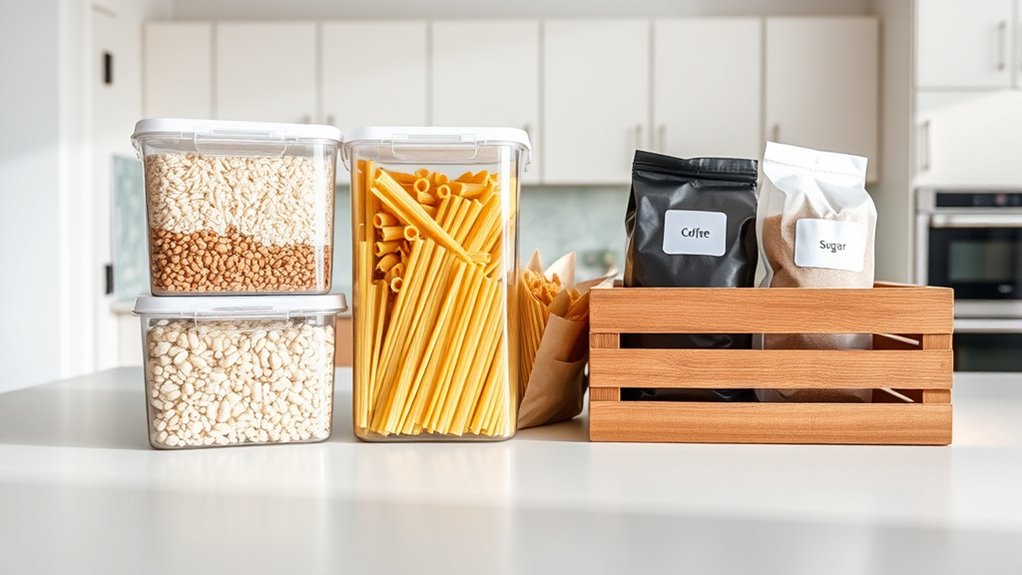
Buying in bulk for items you use frequently can substantially cut your overall expenses. By engaging in bulk shopping, you buy larger quantities at a lower per-unit cost, saving money over time. Warehouse stores are perfect for this, offering significant discounts on everyday essentials like rice, pasta, toiletries, and cleaning supplies. When you purchase in bulk, you’re less likely to make multiple trips to the store, reducing impulse buys and transportation costs. Just make sure you have enough storage space to keep bulk items organized and fresh. Focus on non-perishable goods or items with a long shelf life to maximize savings. Buying in bulk not only lowers your grocery bill but also minimizes trips to the store, helping you stick to your budget more effectively.
Limit Impulse Purchases and Practice Delayed Gratification

To stop impulse buys, set a waiting period before making any non-essential purchase. This helps you avoid acting on temptation in the moment. Additionally, steer clear of triggers like tempting displays or online ads that encourage quick decisions.
Set Waiting Periods
Setting waiting periods before making a purchase is a simple but effective way to curb impulsive spending. When you delay gratification, you give yourself time to evaluate if the item is truly necessary. This practice helps you practice patience and avoid buyer’s remorse. To implement this, consider setting a specific waiting period—like 24 or 48 hours—before buying non-essential items. During this time, you can:
- Reassess whether the purchase aligns with your financial goals
- Explore cheaper alternatives or wait for discounts
- Reflect on whether you genuinely need the item
- Avoid making rushed decisions driven by emotions
Avoid Temptation Triggers
Since temptation can strike unexpectedly, recognizing and limiting triggers that lead to impulsive purchases is vital. Emotional triggers, like stress or boredom, often push you to buy things you don’t need. Social pressures, such as seeing friends splurge or advertisements targeting your desires, can also tempt you into spending beyond your budget. To avoid these pitfalls, identify your emotional triggers and develop healthier ways to cope. Practice delayed gratification by waiting 24 hours before making non-essential purchases, giving yourself time to reconsider. Limit exposure to social pressures by unfollowing tempting online accounts or avoiding shopping alone. By being aware of these triggers, you can reduce impulsive buying and make more intentional, frugal choices that boost your savings each month.
Opt for Free or Low-Cost Entertainment Options

Finding affordable ways to entertain yourself can considerably cut down your expenses without sacrificing fun. You can enjoy your free time without spending a lot by exploring options like free movie nights at local parks or community centers. Community events such as festivals, outdoor concerts, or farmers’ markets also offer enjoyable experiences at little to no cost. To maximize your savings, consider these options:
- Attend free movie nights in your neighborhood
- Participate in local community events and festivals
- Visit free museums or galleries
- Take advantage of outdoor activities like hiking or picnicking
These choices not only save you money but also help you connect with your community and discover new interests. Switching to low-cost entertainment can make your leisure time more enjoyable and budget-friendly.
Find Affordable Alternatives for Your Hobbies

Exploring affordable alternatives for your hobbies can help you enjoy your favorite activities without straining your budget. Look for affordable hobbies that offer budget friendly leisure options, such as DIY crafts, outdoor activities, or digital hobbies like photography or coding. You don’t need expensive equipment or memberships to have fun—many budget-friendly leisure activities can be just as rewarding. For example, swap costly gym memberships for free workout videos or explore local parks instead of paid attractions. Consider borrowing supplies from friends or joining community groups that share resources. By finding affordable hobbies, you can stay engaged and entertained while saving money each month. This approach helps you maintain a fulfilling lifestyle without overspending, making it easier to reach your financial goals.
Automate Savings to Make Saving Easier
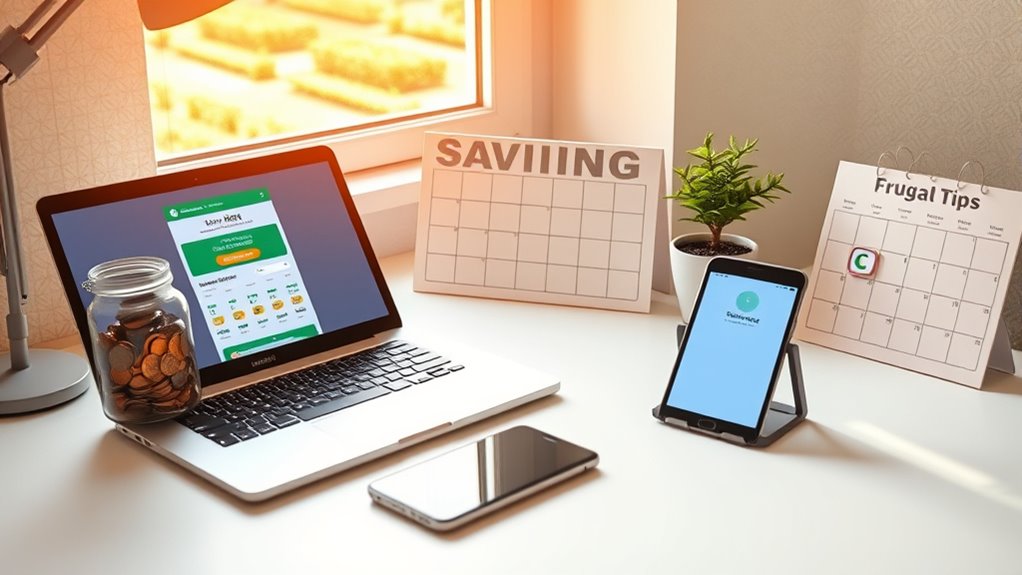
Automating your savings makes it easier to consistently set aside money without having to think about it every month. By setting up automatic transfers, you ensure that a portion of your income moves directly into your savings account on a regular schedule. Using savings apps can help you track your progress and make adjustments effortlessly. This approach removes the temptation to spend what you plan to save, making your goals more achievable. Consider these tips:
- Schedule automatic transfers right after payday
- Use savings apps to monitor your goals
- Automate transfers into multiple accounts for specific goals
- Adjust transfer amounts as your income or expenses change
Automation reduces effort and helps build a habit of saving, making it easier to reach your financial goals each month.
Frequently Asked Questions
How Can I Stay Motivated to Stick to My Budget Long-Term?
Staying motivated to stick to your budget long-term can be tough, but mindset strategies help you stay focused. Remind yourself of your financial goals regularly, celebrate small wins, and visualize your future. Having accountability partners keeps you on track, offering support and encouragement. Share your progress with them, and they’ll motivate you to stay committed. Consistent effort and positive reinforcement make maintaining your budget easier and more sustainable over time.
What Are Some Unexpected Expenses I Should Plan For?
You should plan for unexpected expenses like emergency funds, which provide a safety net for sudden costs such as medical bills or car repairs. Don’t forget to review your annual subscriptions, as they can sneak up on you and drain your budget unexpectedly. By including these in your financial plan, you’ll be better prepared and less likely to derail your savings goals when surprises arise.
How Do I Prioritize Savings Over Current Wants?
Think of your money as a garden—prioritizing needs is like planting seeds first, ensuring a strong foundation. To do this, use budgeting techniques that emphasize saving over wants. Set clear goals and allocate a portion of your income to savings before indulging in non-essential purchases. By focusing on your needs first, you cultivate financial stability, making your savings grow while your wants wait patiently.
Are There Apps That Can Help Track My Expenses Automatically?
You’re wondering if there are apps that can help with expense management automatically. Yes, many budget apps like Mint, YNAB, and PocketGuard link to your bank accounts and credit cards, tracking your expenses in real-time. These apps categorize your spending, helping you see where your money goes and stay on top of your budget without manual input. They’re a great tool to make expense management easier and more efficient.
How Can I Balance Frugal Living With Enjoying Life?
Did you know 78% of people say enjoying life is essential, even when saving money? To balance frugal living and fun, explore budget-friendly hobbies like hiking or DIY projects. Socialize on a budget by hosting potlucks or game nights instead of costly outings. This way, you enjoy meaningful experiences without overspending, helping you stay financially healthy while still making memories.
Conclusion
By weaving these frugal tips into your daily routine, you’ll turn your spending habits into a well-oiled machine that saves you more each month. Think of your budget as a garden—you tend to it carefully, removing weeds of unnecessary expenses and planting seeds of smart choices. Before you know it, your financial landscape will flourish with savings, creating a lush future where your money works for you, blooming brighter with each mindful decision.










